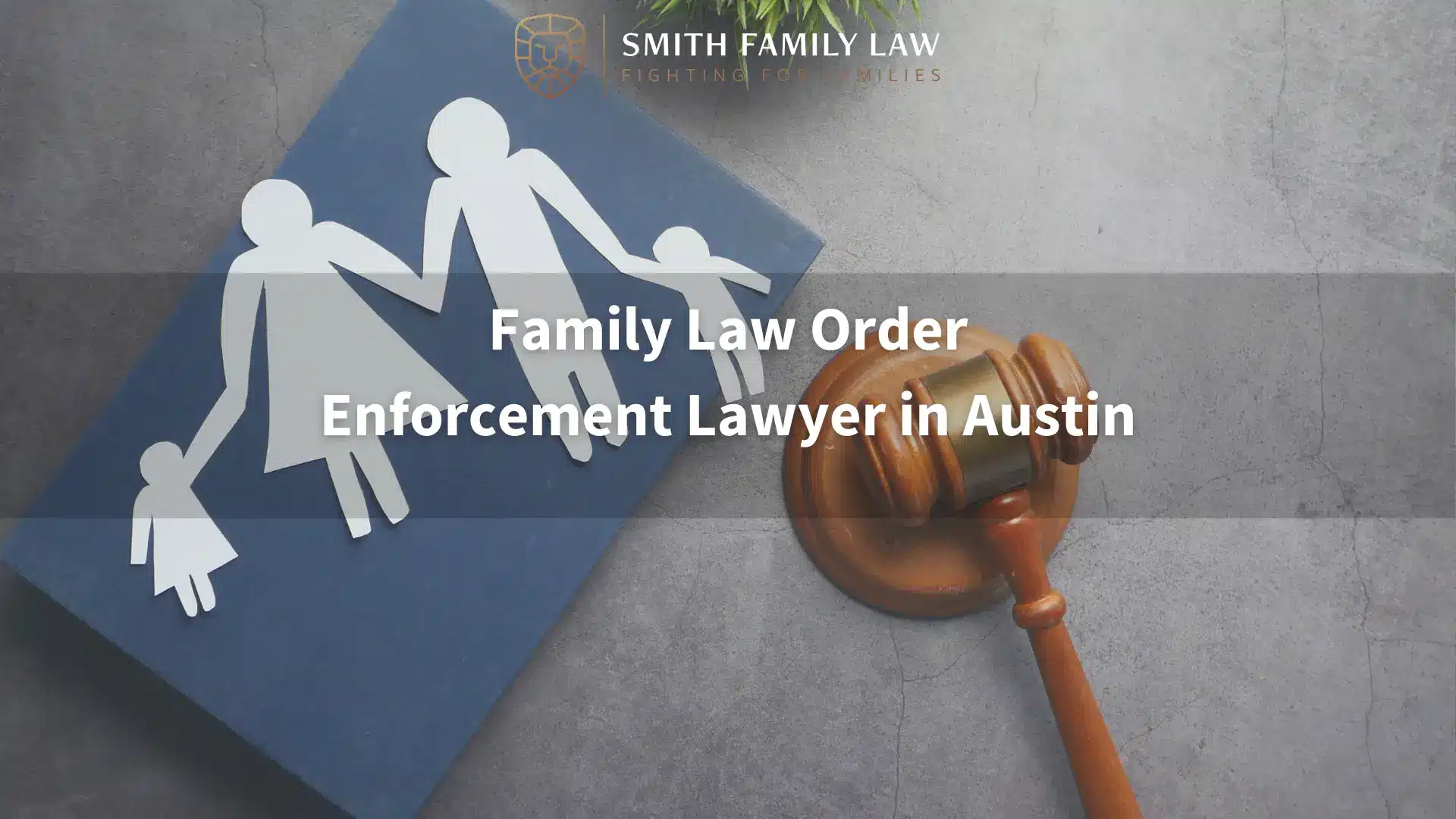Contact Smith Family Law immediately if you need help enforcing a post-divorce court order in Austin, such as spousal maintenance or child support. Few things are more frustrating than going back to court because your former spouse won’t comply with a court order related to your divorce. Whether they refuse to allow visitation with your child, fall behind on child support payments, or withhold spousal maintenance, you need legal representation from an Austin family law order enforcement lawyer to fight for what you deserve.
Smith Family Law is ready to represent you in legal proceedings to enforce the order your ex isn’t following. Call us today at (512) 277-3166 for a free consultation with a family law attorney in Austin to learn more about how we can help.
Family Law Orders the Court Can Enforce in Texas
Enforcement is a term used to describe the legal proceedings involved in making someone obey a court order. In Texas, the courts can enforce various orders related to family law, including:
How to Enforce Property Division After a Divorce
You can file a motion for enforcement with the court if your former spouse isn’t complying with the property division portion of your divorce decree. You must wait until 30 days have passed since the date of the signed divorce decree to request enforcement. However, there is a deadline for filing the motion. The statute of limitations allows a two-year timeframe to file. That means you have two years from the date a judge signs your original divorce decree, or the decree becomes final after an appeal, whichever occurs later.
If the court issues an enforcement order and your ex still doesn’t comply, you can file a motion for delivery of property. If granted, your ex must deliver the property awarded to you in the divorce decree.
The next step is to contact Smith Family Law for legal representation. If your former spouse doesn’t follow the enforcement or delivery of the property order, we can help you hold them in contempt of court. That means they might face a fine or jail time. You can also request a financial award to cover your reasonable attorneys’ fees and court costs incurred from pursuing the enforcement.
Enforcing Spousal Maintenance in Texas
If your ex has never paid court-ordered spousal maintenance or provides less than the amount in the divorce decree, you can file a motion to enforce. The court might grant your motion and recover the required payments using one of the methods below. Consulting with a family law order enforcement lawyer can guide you through the process and maximize your chances of a favorable outcome.
Income Withholding
The court can order your payments to be withheld from your former spouse’s income if a court-ordered arrangement requires them to make periodic payments. Withholding income for spousal maintenance doesn’t apply to the payments someone receives for unemployment insurance benefits.
Combined Order or Writ of Withholding
If you are the managing conservator of a child you share with your ex, the court can combine an order of withholding for spousal maintenance with an order of withholding for child support. A writ of withholding is a document issued to an employer specifying the amount to be withheld.
Income Withholding for Owed Maintenance
The court might order withheld income to pay the required maintenance in the divorce decree and additional withheld income to cover any previous maintenance owed. The amount ordered by the court will be whichever will pay back the owed amount sooner:
- 20% of the amount withheld for current spousal maintenance; or
- An amount that will pay back the owed amount in two years or less.
Filing an Enforcement Action for Child Support
Typically, the noncustodial parent, the parent who doesn’t have primary custody of the child, is the one to pay the other parent child support. You can file an enforcement action if your former spouse is a noncustodial parent and doesn’t provide the required payments according to the current child support order.
The judge can decide on the action by issuing a ruling, such as:
- Determining the parent is in contempt of court, meaning they disobeyed the court order and must pay a fine or serve time in jail
- Intercepting federal income tax refunds or other federal and state money due to the parent
- Filing liens against assets, such as homes or motor vehicles
- Requiring the parent’s employer to deduct the child support payments from their paychecks
- Suspending professional certificates and licenses, driver’s licenses, and fish and game licenses
- Filing a lawsuit against the parent for a judgment against the parent and jail time
- Working with other states, if the parent moves, to collect support payments
Related Posts:
Pursuing a Lawsuit to Enforce Court-Ordered Child Visitation
Sometimes, discussing legal issues regarding divorce is better than immediately filing a lawsuit. However, you might have tried to reason with your ex, and they still won’t let you see your child. If your ex denies your parental rights, you can file a motion for enforcement with the court.
The motion must include information such as:
- Parts of the order your former spouse violated that you want to enforce
- How they violated the order
- The relief you’re seeking
Claiming your ex ignored your calls or wouldn’t drop your child off at home for your scheduled visit isn’t enough proof. You must have evidence showing a pattern of behavior that they denied your visitation rights. You must also show you tried to comply with the order.
For example, mention every instance of your ex keeping you from your child or not being at the agreed-upon pickup location. It probably doesn’t justify an enforcement order if it only happens once or every few months. However, if it occurs frequently and your ex doesn’t show an attempt to remedy the situation, taking them to court might be necessary.
The judge won’t grant your request if you don’t mention the type of relief you want. You can ask for multiple types of relief, such as:
- Jail time
- Fines
- Additional or make-up parenting time
- Community supervision
- Reimbursement of expenses from attempting visitation
Protect Your Rights with a Dedicated Family Law Order Enforcement Lawyer in Austin
Violating a family court order can land someone in jail or lead to expensive fines and other monetary penalties. At Smith Family Law, we understand the delicate nature of your case. You might not want to see your ex face criminal charges but know you deserve the spousal maintenance, child support, or property division arrangement outlined in your divorce decree.
Let our team of family law order enforcement lawyers in Austin help you pursue action against your ex to recover the financial or legal relief owed to you. Call (512) 277-3166 today for a free consultation if you want to enforce a family law order your former spouse violated.
Family Law Order Enforcement FAQs
In this FAQ section, we address some of the most commonly asked questions regarding the enforcement of family law court orders in Texas.
Are There Any Orders That Cannot Be Enforced by Contempt and Jail?
Yes. Holding people in contempt or sentencing them to jail time are powerful ways of compelling them to comply with court orders. However, there are certain limitations to these methods under Texas law, and they are not always appropriate enforcement mechanisms even when they are permissible.
For instance, orders that are not sufficiently clear, specific, and unambiguous might not be enforceable through contempt or jail time. The rationale for this is that a person cannot be held in contempt for failing to comply with an order if it’s not clear exactly what the order requires of them.
Additionally, certain aspects of property division in a divorce decree might not be enforceable through contempt or jail. Instead, courts usually decide that other legal remedies are preferable, such as a suit for clarification or a motion to enforce the property division.
Moreover, orders or portions of orders that involve a person’s constitutional rights, such as the right to free speech, are generally not enforceable through contempt or jail time.
When Will the Court Use Jail Time as a Consequence for an Order Violation?
In Texas, judges use jail time as a last-resort measure for enforcing family law court orders. The court’s primary goal is to ensure compliance with its orders, and while the threat of jail time is a powerful motivator, it’s only appropriate in certain circumstances.
Typically, the court will consider jail time when you violate an order in a deliberate or egregious manner. For example, if a parent continually and willfully violates child custody or visitation orders without a valid reason, the court might consider jail time a possible enforcement mechanism.
Before resorting to jail time, the court usually explores other enforcement methods. This might include modifying the existing order, ordering make-up visitation time, levying fines, or holding the person in contempt of court. Only when these methods fail or when the violation is particularly severe would the court consider jail time necessary.
Anyone facing potential jail time or criminal charges for violating a family law court order in Texas should immediately consult an experienced family law attorney.
What Should I Do If Someone Files an Enforcement Order on Me?
Enforcement actions can arise if someone believes you haven’t followed a court order. If someone files an enforcement order against you in Texas, you must take the matter seriously. Failing to address it could lead to significant legal consequences, including fines and potential jail time.
Here are some steps you should consider if someone says you violated the order:
- Review the Motion: Carefully read the enforcement order to understand the allegations against you and the specific provisions of the court order the other party says you violated. Pay attention to the dates and times so you’re aware of any deadlines for compliance or responses.
- Seek Legal Counsel: A Texas family law attorney can provide guidance, explain your rights, and establish a strong defense or negotiate a resolution on your behalf.
- Gather Evidence: Compile documentation or other evidence you can use to support your case or show the court that you did comply with the original court order.
- Attend All Hearings: Do not miss any court dates related to the enforcement action. Your presence is essential if you wish to defend yourself against the allegations.
- Stay Calm and Cooperative: It’s natural to feel stressed or defensive but remember to remain calm, respectful, and cooperative during the process. This approach can aid in your defense and demonstrate that you’re taking the matter seriously.


